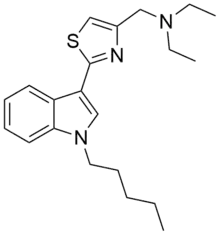 | |
| Legal status | |
|---|---|
| Legal status |
|
| Identifiers | |
| |
| CAS Number | |
| ChemSpider | |
| UNII | |
| Chemical and physical data | |
| Formula | C21H29N3S |
| Molar mass | 355.54 g·mol−1 |
| 3D model (JSmol) | |
| |
| |
PTI-1 (SGT-48) is an indole-based synthetic cannabinoid.[1] It is one of few synthetic cannabinoids containing a thiazole group and is closely related to PTI-2. These compounds may be viewed as simplified analogues of indole-3-heterocycle compounds originally developed by Organon and subsequently further researched by Merck.[2][3][4]
See also
References
- ↑ "PTI-1". Cayman Chemical. Retrieved 8 July 2015.
- ↑ US 7700634, Adam-Worrall J, Morrison AJ, Wishart G, Kiyoi T, McArthur DR, "(Indol-3-yl) heterocycle derivatives as agonists of the cannabinoid CB1 receptor.", issued 20 April 2010, assigned to Organon NV
- ↑ US 7763732, Paul David Ratcliffe PD, Adam-Worrall J, Morrison AJ, Francis SJ, Kiyoi T, "Indole Derivatives", issued 27 July 2010, assigned to Organon NV
- ↑ Kiyoi T, Adam JM, Clark JK, Davies K, Easson AM, Edwards D, et al. (March 2011). "Discovery of potent and orally bioavailable heterocycle-based cannabinoid CB1 receptor agonists". Bioorganic & Medicinal Chemistry Letters. 21 (6): 1748–53. doi:10.1016/j.bmcl.2011.01.082. PMID 21316962.
| Receptor (ligands) |
| ||||||||||||||||||||||||||||||
|---|---|---|---|---|---|---|---|---|---|---|---|---|---|---|---|---|---|---|---|---|---|---|---|---|---|---|---|---|---|---|---|
| Transporter (modulators) |
| ||||||||||||||||||||||||||||||
| Enzyme (modulators) |
| ||||||||||||||||||||||||||||||
| Others |
| ||||||||||||||||||||||||||||||
| |||||||||||||||||||||||||||||||
This article is issued from Wikipedia. The text is licensed under Creative Commons - Attribution - Sharealike. Additional terms may apply for the media files.